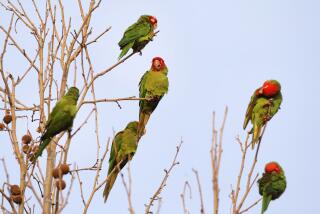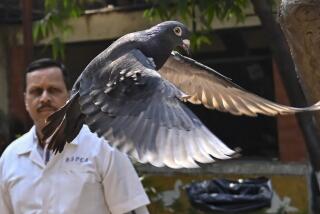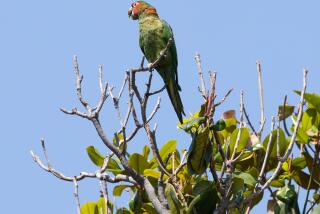Uplifting Sight in Iraqi Skies
- Share via
BAGHDAD — They move like a dark, pretty wrinkle in the sky.
They wheel left. Then right, soaring over minarets and gun battles and a palm tree crackling in flames. They circle smokestacks and lift above the muddy Tigris. And when they’ve flown enough, the man on the rooftop, the one with the mustache and a pocketful of seed, looks toward the sun and calls his pigeons home.
“My birds know me,” Hikmat Ibrahim Abdul-Razzaq says as U.S. troops hurry past his home in search of gunmen. “Iraqis have trained pigeons since the days of Babylon. My father did it, and I do it and my children will follow. I can’t quit this hobby. It is a habit, like smoking.
“Sometimes at night, I come up to the roof and sit by their cages just to watch them.”
Mornings and evenings, the smoky Baghdad landscape is streaked with flocks of pigeons. Some are white and rust-colored. Most are gray with green-tinted necks. They glide in muted patterns and are guided home by men stirring the air with long sticks and colored rags. For those who keep them, the birds offer a kind of redemption and freedom amid the city’s relentless turmoil.
They dotted the arid skies long before Saddam Hussein appeared and they will remain long after U.S. troops depart. Ancient tribes believed pigeons and doves communed with God, and because they always return to their nests, the birds were trained and sent as messengers across the Middle East.
Their eggs are considered lucky; their speed is envied. Like the desert, and to the consternation of window cleaners, they endure.
“I have all kinds of customers,” says Abu Ali, who from his feather-strewn shop sells pedigreed pigeons in the marketplace. “Some love to watch them fly. Others break their wings and put them in their gardens. It is the pressure of our lives. We need pigeons and other things to help us escape this tension.”
Ahmed Abbas Ali climbs a crooked ladder to his roof.
From there, the city is a hazy mess of war ruins and traffic. Ali’s 30 gray pigeons peer at him from the ledge. He stretches out his arms and gathers them. Some flap into their wire-mesh cages and nestle into reed baskets; others whirl in the air around him. Ali says he’s trained his pigeons to travel long distances: They have flown hundreds of miles, close to the Jordanian border and back to Baghdad.
“I don’t use them for messages,” says Ali, who like many pigeon keepers collects his birds shortly after they hatch so they are easily taught to return home. “I just like to watch them fly in the sky in front of me.”
Ali guarded embassies during the U.S. invasion of Iraq in March. Every day at dusk throughout the war, he says, he’d walk home, passing fires and bodies piled near a hospital. He’d climb to his roof and sit with his birds, sometimes soothing them through the night.
“The voice of the missiles scared them,” he says as other flocks lift from distant rooftops and flicker over the city.
Now the missiles are gone but the war doesn’t seem to be over. While Ali tends his pigeons at night, he listens to the firefights around his home and watches his brother, Walid, lie in a bed on the roof with a gun, hoping he will be awakened if thieves try to steal his green BMW.
Sometimes Ali thinks a rooftop is the only safe place to be in today’s Iraq.
“I have four eggs waiting to hatch,” he says.
In this part of the world, pigeons have served the whims of the poor and powerful alike for centuries.
“The caliphs who ruled the Muslim empire after the death of Muhammad in AD 632 developed the pigeon post into a regular airmail system in the service of the state,” according to “Ancient Inventions,” a book by historian Peter James and archeologist Nick Thorpe. “With local postal centers stocked with well-trained pigeons, there was little chance of the caliphs failing to be warned of potential troublemakers in the provinces.”
Around AD 975, the book says, one North African caliph craved cherries from Lebanon. Six hundred pigeons -- each carrying a small silk bag containing a cherry -- flew from Baalbek, Lebanon, to Cairo.
More recently, U.S. Marines preparing to invade Iraq in March carried pigeons in their armored vehicles to detect biological or chemical attacks. If a pigeon died, the troops were instructed, it was time to put on gas masks.
The pigeon souk here opens Friday mornings amid dirt alleys and shop stalls, where flute players roam, lizards and ducks are sold and scorpions dance and fight on the front of a man’s shirt. Kebabs sizzle. The crowds are thick. Parakeets and parrots are peddled from tiny wooden cages near the market’s newest addition: soft-porn CD-ROMs.
But the pigeons -- flapping in cardboard boxes and perching on shoulders -- are the main draw. A few are beautiful. Others are shabby, looking as if they’ve been plucked from gutters. Wings are checked. Claws are tugged. Feathers float through dusty sunlight.
“They’re nonstop fliers,” barks a man near Zuk el Gazil Mosque. “Five thousand dinars, 5,000 dinars,” quoting a price of about $2.50.
Abba Hassan has 30 pigeons at home.
“I need two males so I can marry them,” he says. “I want a flock of 40. They amuse me. It’s the best way I know to relax.”
On the other side of town, Abdul-Razzaq feeds his birds with a pistol at hand.
His 45 birds flutter and coo in a rooftop shed. They perch on wooden dowels and flit above their keeper’s children. Abdul-Razzaq is worried that criminals will find him on his roof. The other day he shot a gang member trying to extort $12 from his blacksmith shop as protection money. “I wounded him in the hip,” he says. “They will want to retaliate.”
He dips his head and thinks about this for a moment. He, his flock and his family survived the war. Now, he says, he must outlast the outlaws.
He turns to his pigeons.
“There is a pigeon code,” Abdul-Razzaq says.
“Yes, there is,” says his friend Zuhair Hashim Yusef, a sweaty man with a bird in his hand.
“You don’t steal another’s pigeon,” Abdul-Razzaq explains. “And if you find someone else’s pigeon, you return it, maybe for $2.”
“There are pigeon wars,” Yusef says. “They are called the hurub. If an enemy has taken a pigeon, or hurt one of your flock, you can capture his pigeons and never give them back. You are free to do whatever you want with them. You can sell them. Break their wings. You can even eat them, but we don’t like to do that.”
Yusef raises his eyebrows and lowers his voice.
“Sometimes,” he says, “a wicked male pigeon gets into the coop and breaks the eggs. Even with pigeons there are bad guys. You have to punish him and separate him from the others until he learns.”
Abdul-Razzaq’s children listen to this. They seem to agree.
He walks near the edge of his sunlit roof. He raises his hands and from the shed comes a muttering of wings. It grows louder and the pigeons burst like a rust-gray flood out the door, flying over hanging laundry and satellite dishes and into a cloudless sky. They split into two flocks, one wheeling over the mosque, the other circling the marketplace.
The children grab fistfuls of seed.
Gunfire echoes below. U.S. troops rush into the courtyard of the mosque. The birds shudder in the sky. They lift higher, their shadows flecking the mud-brown houses and the crumbling villas built nearly a century ago by the British.
Abdul-Razzaq watches and smiles. In a nation where little is certain, he is sure of one thing: His pigeons will return.
More to Read
Sign up for Essential California
The most important California stories and recommendations in your inbox every morning.
You may occasionally receive promotional content from the Los Angeles Times.














